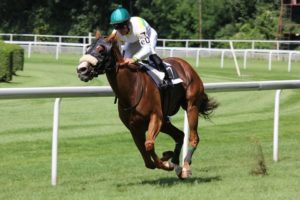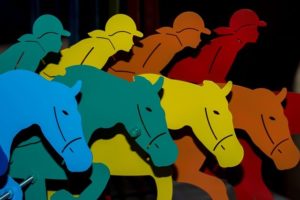What is Handicap Racing?
 Handicap racing is based on the tried-and-tested premise that increasing or decreasing the weight that a horse carries will ultimately affect the speed at which it can gallop over a certain distance. Thus, by allotting each horse a weight proportional to its ability, it is possible to frame a race in which each participant has, at least in theory, an equal chance of winning. Handicap races, Flat and National Hunt, account for approximately 60% of all horse races run in Britain.
Handicap racing is based on the tried-and-tested premise that increasing or decreasing the weight that a horse carries will ultimately affect the speed at which it can gallop over a certain distance. Thus, by allotting each horse a weight proportional to its ability, it is possible to frame a race in which each participant has, at least in theory, an equal chance of winning. Handicap races, Flat and National Hunt, account for approximately 60% of all horse races run in Britain.
Handicap racing was ‘invented’ by Admiral Henry John Rous, who was, at the time, senior steward of the Jockey Club, in the mid-nineteenth century. Nowadays, handicapping is the responsibility of a team of professional handicappers employed by the British Horseracing Authority (BHA). To qualify for an official handicap rating, a horse must run in two or three non-handicap races, so that its ability can be assessed. Thereafter, each subsequent performance is monitored and the official rating may be increased, decreased or remain unchanged as a result. Handicap races are classified as ‘Class 2’, ‘Class 3’, etc, according to the official handicap ratings of the horses are eligible to compete; thus, an improving horse may need to step up in class as its official rating increases.
 The most expensive racehorse ever was the 2000 Kentucky Derby winner, Fusaichi Pegasus, who raced just five times for trainer Neil Drysdale, but nonetheless accrued nearly £1 million in prize money and was sold to Coolmore Stud for £53.7 million at the end of his three-year-old campaign. The sale proved excellent business for his original owner, Fusao Sekiguchi, who bought him for just over £3 million as a yearling, but less so for Coolmore Stud. The son of Mr. Prospector proved a less-than-stellar acquisition and was eventually pensioned off stallion duty, as a 23-year-old, in 2020.
The most expensive racehorse ever was the 2000 Kentucky Derby winner, Fusaichi Pegasus, who raced just five times for trainer Neil Drysdale, but nonetheless accrued nearly £1 million in prize money and was sold to Coolmore Stud for £53.7 million at the end of his three-year-old campaign. The sale proved excellent business for his original owner, Fusao Sekiguchi, who bought him for just over £3 million as a yearling, but less so for Coolmore Stud. The son of Mr. Prospector proved a less-than-stellar acquisition and was eventually pensioned off stallion duty, as a 23-year-old, in 2020.